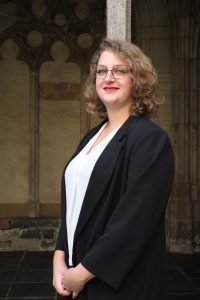Ogni mattina, prima di salire sull’autobus, mi godo il sole e una tazza di buon caffè italiano alla stazione di Saxa Rubra. Stando seduto fuori al sole, in un’atmosfera così diversa dalle giornate buie e cupe che di solito abbiamo in Olanda in questo periodo dell’anno, mi sento ancora più grato di poter essere qui in Italia a svolgere il mio stage al Museo dell’Agro Veientano. Grazie ai disponibilissimi colleghi ospiti del KNIR, sono riuscita a capire come arrivare e come tornare dal museo (fino alla prossima volta in cui gli orari saranno inaspettatamente modificati…), anche se i siti web fanno quasi sentire la mancanza della semplicità del 9292, il servizio di informazioni telefoniche sul trasporto pubblico olandese.
Grazie a un colpo di genio di mia madre, sono arrivata in anticipo al KNIR, due settimane prima dell’inizio previsto per il mio stage. Se non l’avessi fatto, lo stage non sarebbe stato possibile. Così eccomi qui, in viaggio verso la bella cittadina di Formello, un viaggio fortunatamente consentito in base alle attuali restrizioni Covid, per poter finalmente fare un po’ di esperienza pratica con i materiali etruschi. Nonostante questo sia il mio campo di studi già da un po’ di tempo, è stato difficile trovare corsi che si concentrassero esclusivamente sui materiali etruschi. Ora sono in grado di pulire e ricomporre oggetti appena scoperti in tombe e insediamenti presenti nelle vicinanze del museo (in un luogo chiamato La Storta) e in più ho l’onore di lavorare con la Dottoressa Iefke van Kampen. La verità è che negli ultimi cinque anni ho avuto un suo libro sulla mia scrivania, ed è proprio quel libro ad avermi fatto interessare alla cultura etrusca. Ammetto che quando ho capito che avrei collaborato con lei, l’emozione è stata grande. Uno stage è un’esperienza impegnativa e frenetica e il Covid è ancora causa di molta incertezza, ma posso dire che la mia permanenza qui si è già rivelata una delle esperienze migliori e più preziose della mia carriera accademica.
È trascorso circa un mese e mezzo dall’inizio del mio stage, che durerà tre mesi, e ho visto il KNIR svuotarsi piano piano di ospiti. Il mio stage è affascinante e mi sta insegnando molto, ma non poter visitare i musei e i siti archeologici che sono ovunque, né uscire con i compagni di studi, lo rende un’esperienza un po’ solitaria. La tecnologia aiuta, ma non è la stessa cosa del contatto umano. La speranza è che il KNIR torni presto ad essere animato da studenti e borsisti che possano condividere le loro idee. Ho scoperto che questo è un aspetto fondamentale del mondo accademico, un aspetto che abbiamo perso quasi da un giorno all’altro a causa del Covid: sedersi insieme a discutere delle nostre ricerche davanti a una tazza di tè e sentirsi sollevati e ispirati dalle persone che si hanno intorno. Eppure, mentre sorseggio il mio cappuccino al sole, assorbendo un po’ della preziosissima vitamina D, mi sento fortunata ad essere qui e non vedo l’ora di raggiungere i frammenti di vaso che mi aspettano al museo.
Lucy Visser
Internship at the civic museum in Formello (RM) in Spring 2020
The Museo dell’Agro Veientano is a regional museum principally focused on the archaeological heritage, founded in 1992 and in 2005 accepted in the Organizzazione Museale Regionale (OMR)of the Regio Lazio. In September 2016 an agreement was signed for cooperation with a series of civic and private museums in a larger area, creating the system of museums MANEAT, of which Formello is the leading museum.
The museum illustrates all phases of the history of the territory, starting from the Final Bronze Age, including the entire Iron Age with the rich necropoleis, the Etruscan period, Orientalizing and Archaic Age of the city of Veii, the Roman period, starting from the seizure of the town in 396 BC and comprising all phases after antiquity, until Baroque times.
The Museo dell’Agro Veientano may be found in the historical Palazzo Chigi, with building phases going from the 13th to the 17th c. and may be seen as the heir of the 17th c. Curiosity Cabinet Museo delle curiosità naturali, peregrine e antiche of Cardinal Flavio Chigi, which was housed here in the years around 1664.
After years of preparation, the museum reopened its doors in December 2016, with the display of materials going from the Bronze Age to Roman Republican time (room 1-4 on the first floor), and Roman Imperial age to Baroque Period (room 5 and 6 on the ground floor, opened In December 2018).
- handling of archaeological materials: register archaeological remains for museum display and storage, including first inventarisation of materials, updating of catalogue records and archaeological drawing of ceramics;
- museum mediation: communication of the museum contents to its visitors by means of guided tours, working on museum didactics and preparation of museum texts, both in English and Dutch;
- work on the Centro Info-Documentale (CID) of the museum with updating and data-entry of archaeological records according to ICCD standards;
- work on projects carried to be carried out within the new framework of MANEAT;
- work on temporary exhibitions.
Requirements:
- BA in archaeology with preferably a specialization in Medieval Italian Archaeology or Etruscology;
- good communication skills;
- fluent in English and at least basic knowledge of Italian;
- knowledge of the territory in and around Formello is an advantage.
Period: Spring 2020, c. 3 months (precise dates will be established by mutual agreement and availability of rooms at the KNIR)
More information:
museo@comune.formello.rm.it
KNIR offers: free accommodation at the KNIR; 70 euro per week and a compensation of 100 euro for travel costs.
Apply before January 15th 2020 by sending your cv, a copy of your BA diploma and a letter of motivation to secretary@knir.it.

